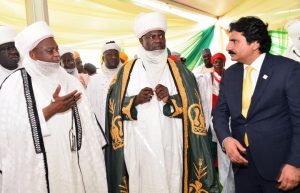
L-R Sultan of Sokoto, Saad Abubakar, Emir of Argungu, Alhaji Samaila Muhammed Mera and the Group Managing Director of TGI Group, Mr. Rahul Savara at the official commissioning of WACOT Rice Limited’s integrated Rice Mill in Argungu, Kebbi State on Tuesday August 1, 2017.
“This state-of-the-art rice mill with a capital outlay of over =N= 10 Billion capable of processing over 120,000 metric tonnes of paddy per annum will create over 3,500 direct and indirect jobs. Your Excellencies, WACOT participates in the entire rice value chain, from seed multiplication and improving farming practices – to processing, branding and distribution. As we increase capacity, we will be off taking paddy from over 50,000 rice farmers.”
This was disclosed on Tuesday, August 1, by Mr. Rahul Savara, Group Managing Director of TGI Group, the parent company of WACOTRice Limited, during the official opening of the WACOT Rice Mill in Argungu, Kebbi State, by the Acting President, Professor Yemi Osinbajo.
The 120,000 metric tonnes Rice Mill, according to Mr. Savara, is part of WACOT’s expansion plan, which targets an increase in its rice milling capacity to 500,000 metric tons in the next few years.
He applauded the federal government for its various initiatives in support of agriculture through the Central Bank of Nigeria (CBN) and other mediums, which are making the vision of ‘ease of doing business’ for the private sector possible.
Commending TGI Group for supporting and investing in the food security vision of the Federal Government, Acting President Osinbajo restated that the Federal Government will in the next two years concentrate its attention on agriculture and food security, energy, (power and petroleum), industrialization and transport infrastructure.
He also disclosed that the Federal Government will continue to work closely with the private sector, giving them the necessary incentives and creating an enabling environment for them to invest and do business.
““This mill is important for several reasons. Firstly it underscores the policies of the Federal Government that it is the private sector that must be the engine of development. The private sector being the engine of development is not just having the sector grow but the growth must be growth with jobs the development we are talking about is growth with jobs. We have seen a lot of jobless growth in some sector of the economy with a lot of revenue coming in but with very few jobs.
With this Rice Mill, Several thousands of our farmers have been engaged in farming, this is a growth with job and the Group Managing Director has assured that in a couple of years, they expect to have engaged 50,000 more farmers. This is the kind of private sector led growth that we want to see”, the Acting President added.
Acting President Osinbajo visited the factory, the first rice mill to be designed and completedduring the administration of President Muhammadu Buhari, in the company of many dignitaries including the Governor of Kebbi State, Senator AbubakarAtikuBagudu, the other 23 members of the Progressive Governors Forum, members of the National and State Assemblies, senior members of the APC…. among others.
The construction of the WACOT Rice Mill was first announced by the Governor of Kebbi State in November 2015, the day President Muhammadu Buhari launched the Central Bank of Nigeria’s Anchor Borrowers Program in Birnin-Kebbi.
While conducting the dignitaries round the factory, the Managing Director of WACOT Limited,Mr.UjwalkantaSenapati drew their attention to the large stock-holding of paddy within the factory. He informed them that the fully automated silos havethe capacity to store raw materials for up to six months of production. These raw materials he explained, were procured from local farmers who are assistedby the company to apply the right agronomic practices to improve their yields.
In his words, WACOT “sees farmers as partners with whom we work together to improve agricultural production”.
The WACOT Rice Mill,which is reportedly the largest parboiled rice mill in Africa, is also the first rice plant in Nigeria with captive power co-generation facility. It will generate electricity from rice husks, thereby ensuring that all by-products and waste products are fully consumed and the environment is protected. It Will also generate 1 MW of electricity via turbines to reduce dependence on the grid.
Post Views: 1,222